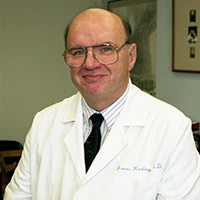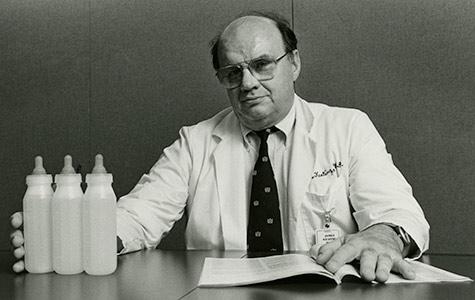
James P. Keating, a meticulous physician who helped mold hundreds of medical residents, organized the first pediatric intensive care unit west of the Mississippi and was sought for his ability to solve mystery illnesses, died Dec. 25, 2014, in Cary, North Carolina. He was 76.
Keating, a professor emeritus of pediatrics at Washington University School of Medicine in St. Louis and the inaugural W. McKim Marriott, MD, Chair in Pediatrics at St. Louis Children’s Hospital, died from a pulmonary embolism.
In a career that spanned 44 years at the university and St. Louis Children’s, Keating’s impact was far-ranging. In 1971, he established the pediatric gastroenterology and nutrition division in the Department of Pediatrics and served as its director until 1992. Recognized as one of that field’s founders, Keating helped develop many now-standard approaches to patient care.
As an early proponent of pediatric intensive care, Keating shaped the first pediatric intensive-care unit in St. Louis and was its director from 1980-92. Keating also pioneered the concept of pediatric diagnostic medicine, founded such a division in 1992 and served as its director until his retirement.
Digging for elusive answers in medicine was a passion. Keating and his colleagues discovered a significant cause of water intoxication — a potentially fatal condition — in infants. They found that 3- to 6-month-olds living in poverty suffered the illness disproportionately because their caretakers were more likely to run out of formula and instead feed infants water. The finding led doctors nationwide to educate parents and caregivers about the dangers of excessive water intake by infants.
“Jim Keating was an outstanding clinician with an incredibly comprehensive knowledge of medicine, an unquenchable thirst for new knowledge, tremendous instincts and a passion for the care of children and the education of trainees,” said Alan Schwartz, PhD, MD, the Harriet B. Spoehrer Professor of Pediatrics and chair of the Department of Pediatrics. “He was the finest pediatrician I have known. We, our patients and hundreds of doctors who trained under him were fortunate to benefit from all that he brought to medicine.”
Keating’s position as director of the pediatric residency program, which he held from 1969-2002, was among the roles he loved most. A demanding teacher, he was both feared and revered by the legions of residents he trained.
“He was a force of nature, a Tasmanian devil of teaching,” said Andrew J. White, MD, the Philip R. Dodge, MD, Scholar in Pediatrics. White, a resident under Keating, became his successor as director of the residency program. “Jim Keating’s attention to detail was apparent on so many fronts. He was an incredible clinician who brought craftsmanship to the language of medicine, stressing its importance in communication and miscommunication, always keeping us on our toes about every word we chose to utter.”
Interminably inquisitive, Keating never stopped learning himself. To become a board-certified pediatrician, physicians are required to pass a board exam. But Keating opted to take the exam every couple of years to stay sharp and prove he could. And if he thought the questions could be worded better, he let the test’s creators know in no uncertain terms, White said.
Keating was born in Braddock, Pennsylvania, a mill town. His father was killed in a mill accident when Keating was 11, leaving his mother to raise four children on her own.
He earned an academic scholarship to Harvard, where he played football. After earning his undergraduate degree, he was accepted to Harvard Medical School. Following his medical school graduation, he worked at Massachusetts General Hospital and then served as a Navy lieutenant at a civilian hospital in Vietnam during the Vietnam War. Among other honors, he received the Navy Commendation for Valor.
After retiring in 2012, Keating moved to North Carolina.
His survivors include his wife, Susan; daughter, Amy Keating Foote; son, Thomas Keating; sister, Mary Sommerfeld; and brothers Larry and Jerry Keating.
A memorial service in celebration of his life will be held at 4 p.m. Friday, April 17 at the Spink Pavilion at the Missouri Botanical Garden. A reception will follow.
In lieu of flowers, memorial gifts may be directed to the James P. Keating Outstanding Resident Fund; Alan Schwartz, Department of Pediatrics; 660 S. Euclid Avenue, Campus Box 8116; St. Louis, Missouri 63110.

Comments and respectful dialogue are encouraged, but content will be moderated. Please, no personal attacks, obscenity or profanity, selling of commercial products, or endorsements of political candidates or positions. We reserve the right to remove any inappropriate comments. We also cannot address individual medical concerns or provide medical advice in this forum.